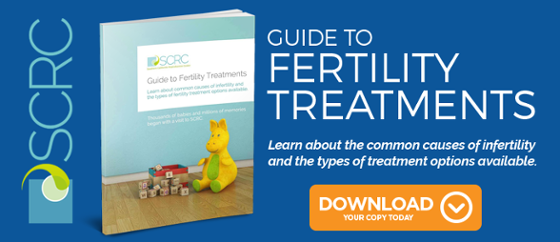
When you’ve taken the big step of scheduling an appointment with a fertility specialist, emotions are probably running high. You’ve been carrying the weight of loss, disappointment and anxiety for months or even years. Somehow, through all of that, you’ve found the strength to act and the courage to hope.
You’re looking for answers, which can be scary, especially when you’re not entirely sure what questions to ask beyond the most obvious one of “how can I have the baby I’ve been dreaming of?” When you’re face to face with your fertility doctor for the first time, it can be a little overwhelming, and suddenly all the queries you rehearsed on the way there have deserted you.
We’re here to help. These ten questions will give you an excellent start to your fertility treatment journey.
1. If my infertility diagnosis is not clear, what tests will we run to narrow down the possible causes?
Before anything else can happen, you and your specialist need to have a good understanding the possible root causes of your infertility. In many cases, there’s more than one factor going on. Diagnostic tests are a valuable tool which can shed light on both female and male factor infertility. One in five cases of infertility remains “unexplained” even after a full diagnostic workup. As frustrating as that can be, the test results are still valuable information which your doctor can use to help you create a treatment. For example, we know that IVF has a high rate of success for young women with unexplained infertility and normal ovarian reserve results and is worth trying in most similar cases.
2. If we know what’s causing my infertility, is this condition likely to get worse over time, stay the same or maybe improve?
The reason behind your infertility can help you and your doctor decide on a time frame for treatment.
- Some problems, such a diminished ovarian reserve or endometriosis, suggest acting as soon as possible, because they are likely to worsen with time.
- If you have a physiological cause behind your infertility, such as tubal scarring from a previous infection or a genetic condition, you may need time to undergo surgical corrections before starting a treatment like IVF.
- If you’re dealing with a hormonal imbalance such as a thyroid disorder, it may improve in time with medication or supplementation.
3. Which treatment do you recommend we try first? Why?
Depending on your specific circumstances, your doctor may suggest beginning with less invasive and costly forms of fertility treatments such as Intrauterine Insemination (IUI) before moving on to Assisted Reproductive Technologies such as IVF. Or, they may recommend that you skip straight to an IVF cycle. This decision should be made on an individual basis, depending on your age, diagnosis, and financial situation. Knowing what to expect and understanding the reasoning behind the choice will help you feel more in control as you move through the process.
4. What are your success rates with this treatment for patients like me?
Fertility clinic success rates are notoriously tricky to decipher sometimes, because they are highly dependant on factors such as patient age and diagnosis. For a success rate to be meaningful and relevant to your situation, you need to be able to compare apples with apples. Ask your doctor about the pregnancy and live birth outcomes for people who specifically match your profile.
5. Are there side effects or risks to this treatment I should be prepared for?
Fertility treatment can be physically demanding. Most patients get through the cycles with a minimum discomfort and disruption, but it’s very important that you are fully informed and aware of any possible side effects. It can help you plan your work and treatment schedule so that you have time to take good care of yourself if you’re finding things difficult. Most importantly, it allows you to keep an eye on your own symptoms so that you can report any potential problems to your clinic before they have a chance to develop into something more serious.
6. How many rounds of this treatment should we try before moving?
There can be so much uncertainty in the world of fertility treatment. Having a plan and boundaries in place before you begin can help you stay grounded even when emotions and hormones are swirling. Your doctor should help you decide ahead of time how many cycles you’ll attempt before you consider changing the treatment plan.
7. If this treatment is unsuccessful, what else can we try next?
Having “somewhere to go” if things don’t work out the first time can be sanity-saving when you’re in a dark place. If IUI doesn’t work, you can try IVF. If your first IVF cycle is unsuccessful, you may be able to attempt a frozen embryo transfer with a leftover blastocyst. You have many options to explore, from Intracytoplasmic Sperm Injection (ICSI) to genetic testing, from donor eggs and sperm to IVF surrogacy. Let your doctor give you a hypothetical road map for the journey.
8. Is there anything I can do to improve my chances of success before, during, and after treatment?
You are in good hands with your highly-trained fertility experts, but it is natural to wonder whether there’s anything you can control yourself which might make a difference. Lifestyle changes or complementary alternative therapies can be helpful: ask your doctor about anything you’re considering, and see if they have any other remedies they might recommend.
9. How much will each cycle of treatment cost and what’s included?
Getting a realistic picture of the cost of fertility treatment up front is a vital part of planning your course of action. Find out specifically what tests, procedures, and medications are included in a cycle, and which you’ll need to pay for separately. Commonly, services and medications provided by suppliers outside the clinic (such as anesthesiology, injectable fertility medication, frozen embryo storage etc) will be billed separately.
10. Do you accept insurance or offer payment plans?
Funding fertility treatment is a significant investment for most families, and it can be stressful trying to figure out how to cover your care. Diagnostic testing is often covered by insurance, while treatment rarely is. However, if you live in a state where insurance coverage for infertility treatment is mandated, or if your insurance does cover a percentage regardless of legislation, you want to be sure that your chosen specialist and clinic will accept your insurance plan. For families without insurance coverage, IVF financing plans are sometimes available at reasonable rates which allow you to spread the cost over time. Paying for the treatment you need may be a lot more accessible than you think.
We often talk about the empowering nature of education when it comes to fertility treatment and the importance of demystifying the medical terminology and dispersing the clouds of misinformation about infertility.
Sometimes, though, beyond all the research and facts, what you really need is a simple list of questions that you can keep in your notebook, ready to help you through that first visit. If you ask all of these questions (remember to bring a pen to write down the answers!) you’ll leave the clinic feeling much more clear about the path ahead of you.
Share this on social media:




